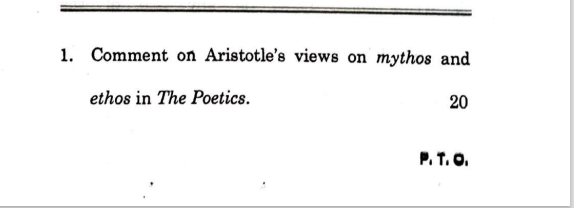
Aristotle lived from 384 B.C. to 322 B.C. He was a Greek philosopher and the most distinguished student of Plato. Among his critical works, only two survived- ‘Poetics’ and ‘Rhetoric’. Poetics deals with the art of poetry and the latter with the art of speaking. Poetics contains twenty-six small chapters. The fourteen chapters are only allotted to tragedy. In poetics, Aristotle discusses the two terms mythos and ethos. In Poetics Aristotle introduces six constituent parts of tragedy. Mythos and Ethos are the two important constituent parts of a tragedy. Apart from the mythos (plot) and ethos (characters), there are four constituent parts of tragedy, such as thought, diction, song, and spectacle. Following are the views of Aristotle on mythos and ethos.
Mythos or myth
For the ancients, mythos or myth simply meant the story, commonly translated into English as plot. Aristotle has called myth ‘the soul of tragedy. Plot means the arrangement of the incidences. This passage of episodes or action has been called a myth. Aristotle considers the plot as the most important part of the tragedy because tragedy is an imitation of action. Not of men, but men in action. Aristotle says, “Without action, there cannot be a tragedy; there may be without character’.
According to Aristotle, the plot is the soul of the tragedy. It is a collection of interrelated actions. The plot should have unity of action. In other words, a tragedy is the combination of different actions from the life of the hero. These actions are intimately connected as one whole forms the plot. If any one of them is displaced or removed, the whole unity will be lost. In an ideal tragedy, there will be unity of action. It means a tragedy should have a beginning, middle, and ending. In other words, we can divide the plot into two parts- complication and catastrophe.
Aristotle defines two kinds of plots: the simple and the complex plot. According to Aristotle, a good plot is a complex plot. Suspense is one of the important characteristics of a complex plot. The occurrence of peripetia and anagnorisis is only possible in complex plots. Peripetia is a reversal of fortune from good to bad or from high to low. Anagnorisis is the recognition of the causes of falls.
Pathos or Suffering: pathos and sufferings are also an important part of a good plot. The hero of the tragedy is essentially a good man therefore his sufferings, fall death should produce Pitty, fear, and a cathartic effect on the audience.
Ethos or characters.
The character in a tragedy can be men and women who act in the play. Heros and heroin are the two important figures in the play. Broadly speaking, characters in a tragedy had to be ‘good men’
According to Aristotle, the following are the characteristics of an ideal character in a tragedy. 1. The first requirement was goodness in terms of morality. 2. the behavior of a character must be suitable for their social rank. 3. A character must be true to life. It means characters must be believable. 4. The kind of behavior assigned to a character must not change suddenly.
Aristotle says that the character of a person determines men’s qualities. But it is their actions that decide whether they are happy or sad. Because of their deeds, we know them. So it is these deeds or actions that are woven into the plot that matters. Character is thus next only in importance to the plot.
